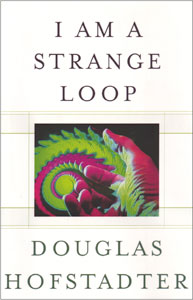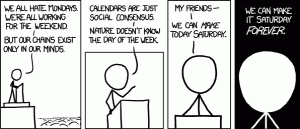 In I Am a Strange Loop, an attempt to show how consciousness arises, Douglas Hofstadter at one point is explaining how Kurt Gödel deflates the grand ambition of Bertrand Russell and Alfred North Whitehead’s Principia Mathematica.
In I Am a Strange Loop, an attempt to show how consciousness arises, Douglas Hofstadter at one point is explaining how Kurt Gödel deflates the grand ambition of Bertrand Russell and Alfred North Whitehead’s Principia Mathematica.
I’m reading this explanation, and not following it at all—I’m that mathematically adept I still have problems with fractions—when I come across the following passage, which teases me with the notion I might finally be getting a glimmer.
“This may sound a bit abstruse and remote,” says Hofstadter, who is no one’s fool, “so let me suggest an analogy. Imagine the challenge of writing out a clear explanation of the meaning of the contemporary term ‘soap digest rack’ in the ancient Indian language of Sanskrit. The key constraint is that you are restricted to using pure Sanskrit as it was in its heyday, and are not allowed to introduce even one single new word into the language.”
Hofstadter suggests it would be necessary, right from the outset, to explain the ideas of “electricity and electromagnetic waves, of TV cameras and transmitters and TV sets, of TV shows and advertising, the notion of washing machines and rivalries between detergent companies, the idea of daily episodes of predictable hackneyed melodramas broadcast into the homes of millions of people, the image of viewers addicted to endlessly circling plots, the concept of a grocery store, of a checkout stand, of magazines, of display racks, and on and on…”
So, says Hofstadter, “Each of the words ‘soap’, ‘digest’, and ‘rack’ would wind up being expanded into a chain of ancient Sanskrit words thousands of times longer than itself. Your final text would fill up hundreds of pages in order to get across the meaning of this three-word phase for a modern banality.”
From there, he goes on to relate all that to what Gödel has to say about how Russell and Whitehead, in principle, couldn’t say what they wanted to say with Principia Mathematica. And I still don’t understand his argument, not entirely. I still don’t even know what the hell a “soap digest rack” is, come to that, never mind I’m no ancient Indian speaker of Sanskrit.**
While we let that stuff simmer away in the back of our minds, let me tell you a vaguely related story.
Some long time ago, when I was taking a short intensive course in Inuktitut in preparation for spending several months in the High Arctic, someone told me, or I read somewhere, that the Inuit had to render “weekend” as a long, rambling circumlocution of an agglutinative nature, where you keep adding bits onto the end of the initial word till you think you might have what it is you want to say.
The only Inuktitut I can find online for weekend is pinasuarusiup, which isn’t that long. It actually does sound familiar, but I could have sworn there was a longer version, one that, literally transliterated, amounted to something like this:
Weekend: a period of two days that follows a period of five days during which Southerners/madmen* perform something they call ‘work,’ for some reason, an activity that leaves them so knackered and out of sorts that they need time to recover; and, even though two days isn’t enough, that’s what a “weekend” is.
That’s not quite right, but it conveys the gist of the Inuktitut circumlocution needed to express this alien and pretty silly concept. (English, on the other hand, needs “crystalline snow on the ground” to express the idea of “pukak.”)***
So what’s the point of this post? I don’t know, actually. It seemed pregnant with something significant, but that part seems to have escaped me.
* Qadlunak, Inuktitut for “Southerner,” was also commonly used to refer to “madman.”
** I’ve just done an online search for “soap digest rack,” and came up with enough info. to work it out. All this was terra incognita to me. Is it true then that supermarkets, back wherever, actually have whole racks of these items? Wow. Hey, what is it about those qadlunaks, eh? 
*** For accounts of how many words the Inuit have for snow, see The Canadian Encyclopedia and Wikepedia.
**** And have a look what our collective consciousness has to say about Gödel’s incompleteness theorems. As soon as you boil this down to about five sentences, you can post it as a comment right here, okay?
Pukak:
Thanks to xkcd for permission to use the comic strip.



Inuit-qadlunak cross-fertilization: http://www.collinpiprell.com/english-language-needs-iktsuarpok/.